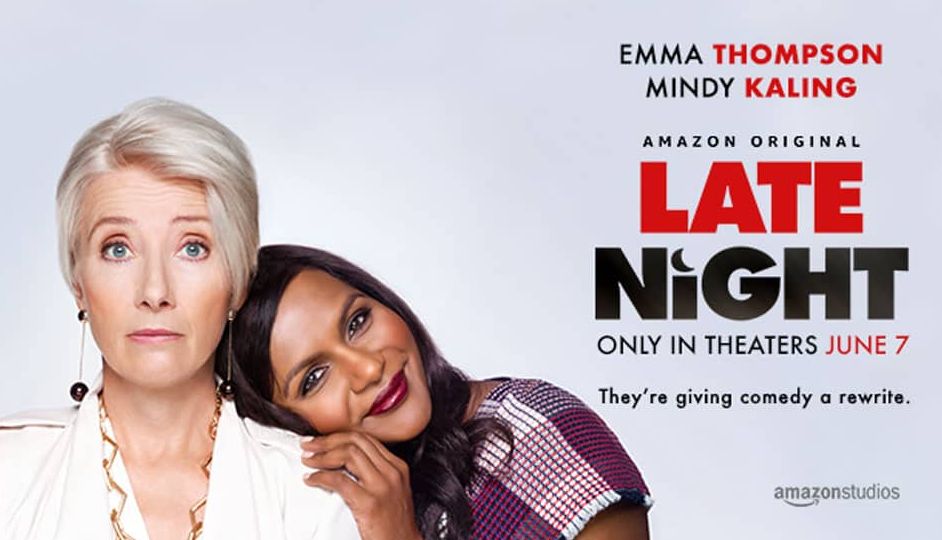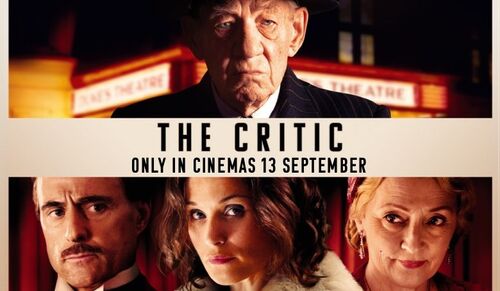
'Late Night' Review
 I’m proud to have some first-hand, late night network talk show experience. I’ll never forget my two appearances on “The Tonight Show with Jay Leno”, including getting to learn a little bit of what goes on behind the scenes at these shows.
I’m proud to have some first-hand, late night network talk show experience. I’ll never forget my two appearances on “The Tonight Show with Jay Leno”, including getting to learn a little bit of what goes on behind the scenes at these shows.
I got to watch Jay rehearse his monologue (in his trademark denim on denim), be part of the “pre-interview” process, work with segment producers. I even got a first-hand lesson on how a band leader organizes the music for every show (Rickey Minor actually composed a custom intro theme for my walk-ons).
Talk shows have been a staple of American culture since television was invented. They’ve always fascinated me. Actress/comedian Mindy Kaling clearly feels the same way, which inspired her to pen “Late Night”. Kaling also stars as Molly, the new, female writer for an iconic (fictional) late night talk show with a female host.
In 2010’s “Morning Glory”, Rachel McAdams played a young producer of a NYC-based network morning program. She tried to increase ratings by shaking things-up on air and lightening-up stiff anchorman Harrison Ford. “Late Night” mirrors that movie in many ways. When Kaling’s Molly joins the staff of “Tonight with Katherine Newbury” the show has been in a ratings decline for the past decade.

The highly intellectual, British host (played by Emma Thompson) has been doing the show for 28 years. But she hasn’t evolved with the times. She’s not bringing-on current, popular guests or doing viral-worthy bits. And she no longer has an “edge” on camera. The president of the network (Amy Ryan) wants her out. Newbury’s husband (John Lithgow) tells her that she has to fight to keep her show. Ultimately it’s Molly, Newbury’s only non-white, non-male writer, who has to convinces her that change is necessary.
Kaling, who was an intern on “Late Night with Conan O’Brien” before her landing her breakthrough role on “The Office”, gets some elements of the talk show world spot-on. Others are clearly Hollywood-ized. Having Newbury and most of the male writers admit they’d never met before this crisis just doesn’t ring true. Overall, the first half-hour or so of “Late Night” plays a bit awkwardly and flat – tones I feared from watching the trailers.
But then there’s a much-welcomed shift. Kaling and director Nisha Ganatra allow the story to primarily focus on Newbury. She has no kids, no friends, doesn’t do social media and has suffered from depression nearly her entire life. There’s more than a little Larry Sanders (and maybe even Garry Shandling) in the Newbury character. “Late Night” becomes more of a serious drama than a goofy, satirical comedy. The only punchlines in the script come at the end of jokes in Newbury’s monologues.
Thompson elevates the material and delivers a surprisingly gritty, honest performance. She has a number of standout scenes, as a gutsy, fearless leader who’s also very human. It’s easy to empathize with her as she’s being criticized, attacked, neglected and pushed-out — while trying to hang-on to the only thing she knows how to do.
Kaling incorporates #MeToo workplace themes of sexism, inequality and modern relationship struggles into the script. The majority of the time she gets her points across by not being too preachy. “Late Night” isn’t the sharpest or most insightful movie about television. But it works because the spotlight stays primarily on Thompson, whose character isn’t out to prove that she’s a talented and credible host, but as Newbury says several times, that she’s simply earned the privilege of your time.


